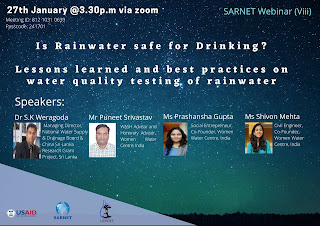“Is rainwater safe for drinking? Lessons learned and best practices on water quality testing of rainwater”
The SARNET webinar 8 on the theme “Is rainwater safe for drinking? Lessons learned and best practices on water quality testing of rainwater” concluded on the 27th of January 2022 joined by speakers from Sri Lanka and India. Development practitioners, activists, researchers, and enthusiasts from the South Asia region representing the WASH sector from South Asia region attended the webinar.
This webinar was moderated by Mr. Zaheer Gardezi a Civil Engineer and a
development professional from Pakistan. Dr. S.K Weragoda, Managing Director of
the National Water Supply Services and Drainage Board, Sri Lanka, and the team led
by Mr. Puneet Srivastav from WASH Solutions and Ms. Prashansha Gupta and Ms.
Shivon Mehta from Women Water Centre, Lucknow, India presented the general
perceptions, the daily drinking water demand, concerns stemming from lack of
awareness and accessibility to water quality testing of harvested rainwater and
innovative approaches to address the situation.
Opening the webinar Mr. Gardezi shared about his experiences related to biological,
physical, and chemical testing on the water quality of rooftop harvesting at the
National University of Science and Technology, Islamabad in Pakistan. Convincing
policymakers despite the northern area of earthquake affected region in Pakistan
having the largest-ever rooftop water harvesting and addressing the negative
perceptions of the general public about the quality of rainwater for drinking
purposes were among the key challenges encountered by Mr. Gardezi who was
campaigning on rainwater harvesting.
The negative perceptions among the general public regarding using
harvested rainwater for drinking stem from issues related to maintenance,
unpleasant taste, an odor in the water, etc. “In Sri Lanka in urban areas water
demand is 140 liters per day per person while in the rural areas, it is 10 liters
per person per day. A 2.2 million
cubic meters of water per day is supplied to 50% of the total population in the
country by the National Water Supply Services and Drainage Board” stated Dr S.K
Weragoda. The importance of exploring and utilizing rainwater harvesting as Sri
Lanka is one of the worst affected countries by Climate change was emphasized
by Dr Weragoda. In 2018 Sri Lanka has been ranked as the 2nd most affected
country by climate change and in 2019 the country was ranked as the 06th. Dr.
S.K Weragoda presented the features of the Sponge City approach used to collect,
store and test the water quality of harvested rainwater.
Water quality testing often involves a high cost and is a time-consuming laboratory process stated Mr. Puneet Srivastav from WASH Solutions, India presenting the observations that led to the establishment of the Women Water Quality Centre initiative. The labs being out of reach of the common people had led to a low level of awareness and corresponding action in urban and rural communities. It results into one size fits all approach to water filtration. Market-driven high-cost technologies make safe water inaccessible to large populations at the bottom of the pyramid and resulting in high water footprints and leads to unsustainable water management practices. Women Water Centers uses an entrepreneurship approach for quality testing coupled with increasing the financial independence of women. The first women's
water Centre has been established in Lucknow in Uttar Pradesh. It is a start-up by Swiss Water partnership and WASH Solutions. It is the first sensor and smartphone-based water quality testing Centre. This Centre conducts water quality testing, treat (drinking and water treatment), and providing end to end services for collecting rainwater. The services are provided at the household and institutional level. More information on the webinar is available on SARNET social media platforms.

Comments
Post a Comment